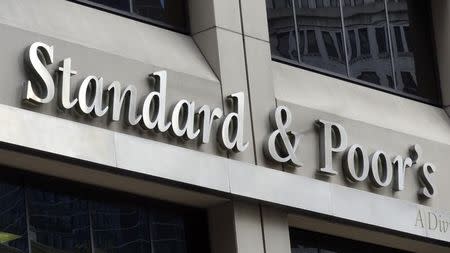South Africa may dodge credit rating cut on Friday but risks remain: analysts

By Stella Mapenzauswa JOHANNESBURG (Reuters) - Standard & Poor's will probably not cut South Africa's credit rating into "junk" territory on Friday, analysts say, but it may warn that any signs of political upheaval undermining economic policy could trigger a downgrade later in the year. S&P, which rates the sovereign debt of Africa's most industrialised country one notch above speculative grade at BBB- with a negative outlook, has previously warned that a weak economic outlook also poses a risk to the country's rating. S&P is due to announce the results of its latest review on Friday, following meetings with policymakers in Pretoria. A cut to below investment grade would push up South Africa's borrowing costs, making it harder to plug a budget deficit projected at 3.2 percent of GDP in the 2016/17 financial year. The move would lump South Africa with emerging market peers Brazil, Russia and Turkey, who have also been downgraded by the ratings agencies. Fitch, which like S&P rates South Africa one step above subinvestment grade, is expected to issue its own review next week, according to Finance Minister Pravin Gordhan. Pretoria last month dodged a downgrade from Moody's, which held its rating at Baa2. Gordhan has expressed optimism that Pretoria's history of fiscal discipline should come to the rescue. Some analysts agree. "We think S&P will give South Africa the benefit of the doubt for now," BNP Paribas Securities economist Jeffrey Schultz said. "Nevertheless, S&P is likely to give a clear warning that, without better policy formation and implementation, a downgrade to junk remains on the cards." Ratings agencies are worried the Treasury could be distracted from efforts to rein in the budget as it grapples with the political turmoil seen since President Jacob Zuma changed finance ministers twice in less than a week in December. Gordhan, reappointed in December to calm jittery markets after a previous stint in 2009-2014, has set out to reassure ratings agencies and investors that he is committed to stabilising public debt at below 50 percent of national output. Following a roadshow to the United States and Britain by Gordhan to reassure investors, the Treasury successfully issued a $1.25 billion 10-year international bond overseas to help finance its medium-term foreign-currency commitments. Gordhan said the successful outcome was a sign of investor confidence despite the political upheaval, which has included President Jacob Zuma surviving an impeachment vote called after the Constitutional Court said he breached the law by ignoring an order to repay state funds spent on renovating his home. Zuma is also hoping for a ratings reprieve from both S&P and Fitch, with local elections due in August. His African National Congress party faces a strong challenge from opponents seeking to capitalize on what they see as his economic and political missteps. "Avoiding a downgrade yet again would be an important confidence-booster, especially for ... Zuma, who would no doubt seek to exploit the outcome as a means of silencing critics who accuse him of being a key obstacle to restoring investor confidence," Teneo Intelligence analyst Manji Cheto said. (Editing by James Macharia and Hugh Lawson)

